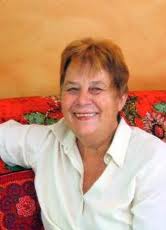In the summer of 2007 I decided to do a Short Story Writing Course with SA Writers’ College. This proved to be one of my most rewarding decisions I have made in my life.
Enter my tutor, Ginny Swart: the most amazing, approachable, easy-going lady I have had the pleasure of knowing. Studying with SAWC is strictly via correspondence over a period of about six months. During this time Ginny was professional yet caring. When writer’s block or doubt set in, Ginny would casually dust the cobwebs away, as she encouraged me to continue with my passion for writing. She shared my every fear, aspiration, frustration and joyful moment.
I caught up with her recently when she kindly left her keyboard for half an hour to chat with me
Q: What has been your most memorable writing achievement?
A: Lots of little ones. Having my first book titled “Nosipho King of the Bones” aimed at teenagers published by McMillan. Winning first prize in the UK Real Writers Prize and flying across the sea to be awarded my prize. The excitement as I flew will forever be etched in my mind.
Q: How easy it is to make a living as a writer?
A: Difficult! However, having said that I truly believe if writing is your passion, you will happily accept living on bread and water. Not many short story writers make a living from writing; most of them have day jobs as well. Although as I already mentioned, it can lead to writing best selling novels. I live in hope.
Q: What general advice would you give aspirant writers trying to make a mark on the world?
A: Join a writing group to have genuine, critical feedback on your work. Many eyes ease the editing!
Most magazines have guidelines for writers so, email and ask for them. I would suggest aiming for a particular market. Try and hone your skills to suit them. Read as much as you can about the readers and analyze what they prefer. If the editor likes romance, give her that. Whatever she needs – you deliver.
Q: How does a writer go about getting published?
A: Capital P for Positive. Keep subbing your work and don’t curl up into a ball of misery when another rejection comes your way. Instead – chin up and keep subbing.
Q: Where do you find your ideas for your stories?
A: In all different corners of my mind and imagination. You can sell one story to five different magazines in five different countries by merely changing names and locations.
Q: What are some of your most valuable writing tips you received and what would you give as tips to fledgling writers?
A:
- The setting out of your writing should be perfect. Always use double spacing and a font like Times New Roman size 12.
- “Word count” are two very important words to learn when becoming a writer! If an editor asks for a word count of 2000 – give her a word count of 2000.
- Lastly, originality. Nothing captures my attention more than an unforeseen twist in the tale or a strong happily ever after.
About the author:














